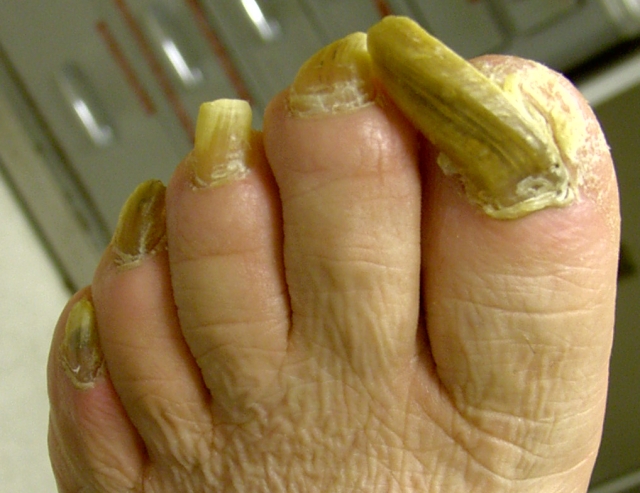Onychogryposis: Difference between revisions
| (2 intermediate revisions by the same user not shown) | |||
| Line 21: | Line 21: | ||
==Overview== | ==Overview== | ||
'''Onychogryposis''' is a thickening and increase in curvature of the [[nail (anatomy)|nail]]. An affected nail may have many grooves and ridges, is usually brownish in color, and grows more quickly on one side than on the other. | '''Onychogryposis''' is a thickening and increase in curvature of the [[nail (anatomy)|nail]]. An affected nail may have many grooves and ridges, is usually brownish in color, and grows more quickly on one side than on the other. | ||
==Pathophysiology== | |||
===Associated Conditions=== | |||
*[[Anemia]] | |||
*Chronic [[chemical]] damage | |||
*[[Lichen|Lichen ruber]] | |||
*[[Thyroid Disease]] | |||
==Causes== | ==Causes== | ||
| Line 26: | Line 35: | ||
===Common Causes=== | ===Common Causes=== | ||
It is usually the result of injury to the [[matrix (biology)|matrix]], sometimes coupled with a long term [[fungal infection]], which causes the nail to grow more thickly. It may be partially [[hereditary]] and is caused by neglect. It is most commonly seen in the great [[toe]] but may be seen in other toes as well as the fingernails. | It is usually the result of injury to the [[matrix (biology)|matrix]], sometimes coupled with a long term [[fungal infection]], which causes the nail to grow more thickly. It may be partially [[hereditary]] and is caused by neglect. It is most commonly seen in the great [[toe]] but may be seen in other toes as well as the fingernails. Unusual thickness is also associated with circulation problems. | ||
===Causes in Alphabetical Order=== | ===Causes in Alphabetical Order=== | ||
| Line 32: | Line 41: | ||
*[[Fungal infection]] | *[[Fungal infection]] | ||
*[[Genetics]] | *[[Genetics]] | ||
*[[Haim-Munk syndrome]] | |||
*[[Injury]] | *[[Injury]] | ||
*[[Jadassohn-Lewandowsky syndrome]] | |||
*[[Neglect]] | *[[Neglect]] | ||
Latest revision as of 14:01, 13 August 2012
| Onychogryposis | |
 | |
|---|---|
| ICD-10 | L60.2 |
| ICD-9 | 703.8 |
| DiseasesDB | 29441 |
|
WikiDoc Resources for Onychogryposis |
|
Articles |
|---|
|
Most recent articles on Onychogryposis Most cited articles on Onychogryposis |
|
Media |
|
Powerpoint slides on Onychogryposis |
|
Evidence Based Medicine |
|
Clinical Trials |
|
Ongoing Trials on Onychogryposis at Clinical Trials.gov Trial results on Onychogryposis Clinical Trials on Onychogryposis at Google
|
|
Guidelines / Policies / Govt |
|
US National Guidelines Clearinghouse on Onychogryposis NICE Guidance on Onychogryposis
|
|
Books |
|
News |
|
Commentary |
|
Definitions |
|
Patient Resources / Community |
|
Patient resources on Onychogryposis Discussion groups on Onychogryposis Patient Handouts on Onychogryposis Directions to Hospitals Treating Onychogryposis Risk calculators and risk factors for Onychogryposis
|
|
Healthcare Provider Resources |
|
Causes & Risk Factors for Onychogryposis |
|
Continuing Medical Education (CME) |
|
International |
|
|
|
Business |
|
Experimental / Informatics |
Editor-In-Chief: C. Michael Gibson, M.S., M.D. [1]
Synonyms and keywords: Onychogryphosis; claw-like nails; ram's-horn nail
Overview
Onychogryposis is a thickening and increase in curvature of the nail. An affected nail may have many grooves and ridges, is usually brownish in color, and grows more quickly on one side than on the other.
Pathophysiology
Associated Conditions
- Anemia
- Chronic chemical damage
- Lichen ruber
- Thyroid Disease
Causes
Common Causes
It is usually the result of injury to the matrix, sometimes coupled with a long term fungal infection, which causes the nail to grow more thickly. It may be partially hereditary and is caused by neglect. It is most commonly seen in the great toe but may be seen in other toes as well as the fingernails. Unusual thickness is also associated with circulation problems.
Causes in Alphabetical Order
Natural History, Complications and Prognosis
The thick curved nail is difficult to cut, and often remains untrimmed, exacerbating the problem. Long, untreated nails due to onychogryphosis are an often a hidden cause of disability among the elderly.